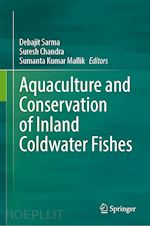
Questo prodotto usufruisce delle SPEDIZIONI GRATIS
selezionando l'opzione Corriere Veloce in fase di ordine.
Pagabile anche con Carta della cultura giovani e del merito, 18App Bonus Cultura e Carta del Docente
This book provides the latest information on trans-Himalayan Hindu Kush Region (HKR) fisheries including the Indian Himalayan Region (IHR) as well as the historical context of its sustainable development for improving livelihood and nutritional security. The book serves as an important document to provide knowledge and information about the major concerns of environmental and anthropogenic factors that have impacted the population of certain important fishes in the ecosystem and the strategies and policies required for the conservation of these important groups of fishes, viz., Mahseer, snow trout, minor carp, catfishes, etc. The chapters describe the information to the readers on potential cold water and cool water fish species suitable for large-scale farming and propagation addressing the issues of diseases, nutrigenomics, and nanobiotechnology. This book also addresses the prospects and potential of recreational fishing in India and the scope for its improvement to generate more employment and income citing the success stories and primary information from reputed anglers. Finally, the book also elucidates a comprehensive yet representative description of many challenges associated with inland coldwater- cool water fisheries and aquaculture in HKR, IHR, and its way forward.
Dr Debajit Sarma is presently working as Head, Division of Aquaculture, ICAR-Central Institute of Fisheries Education (ICAR-CIFE), Mumbai. He worked as a Principal Scientist at ICAR-Directorate of Coldwater Fisheries Research, Bhimtal, 263136, Nainital, Uttarakhand, India for more than 12 years. He also worked as a Director (Acting) at ICAR-DCFR for 3 years. He was awarded Fellow of Academy of Environmental Biology, AEB Gold Medal, Fellow of Zoological Society of India, Dalela Oration Award, Eminent Scientist Award, IBRF Excellence Award, Scientist of the Year-2017, VRP Sinha Award, CFSI Honour and "Certificates of Appreciation" from Department of Fisheries, Govt. of Mizoram; Govt. of Sikkim; Govt. of Nagaland; Assam Bhoreli Angling and Conservation Association, Assam; Jasingfaa Aqua-tourism Centre, Assam; Guamco Society, Arunachal Pradesh; Gauhati University, Assam and Rajib Gandhi University, Itanagar, Arunachal Pradesh for his outstanding contribution in the field ofAquaculture and Fisheries Science. His area of research interest is Aquaculture & Conservation. He has standardized the hatchery management and seed production technology of golden and chocolate mahseer in India. Dr. Sarma has noteworthy contribution of establishing mahseer hatchery and eco-tourism centres in India and the concept of "Mahseer Watching" is well recognized. Dr. Sarma is also having expertise on evaluation of nutrient profiling of coldwater fishes. He is having in his credit 104 research papers in peer-reviewed international and national journals and 160 research/technical articles including books, book chapters, manuals and bulletins. Dr. Sarma is the Editor of three important International/National research journals and has been reviewer for several national and international peer reviewed journals. He is also serving as the Visiting/ Adjunct Faculty of more than 10 reputed Universities in India. He has successfully completed more than 20 research projects fundedby different scientific organizations developing package of practices for the benefit of the multiple stakeholders. During the tenure of 25 years of service, he has guided 1 National Post Doctoral Fellow, 10 Ph.D., and 12 M.Sc. students as Major Supervisor. He has organized 15 national seminars/symposia in the capacity of organizing secretary and also conducted 50 national HRD program as course Director/Coordinator benefiting 10000 fish farmers & officers. He has participated and presented papers in several international seminars and training programs in abroad in various capacities. Dr. Sarma is the Founder Secretary and former President of Coldwater Fisheries Society of India.
Dr. Suresh Chandra is currently working as a Principal Scientist (Fish Pathology) at Directorate of Coldwater Fisheries Research, Bhimtal, Uttarakhand, under the aegis of the Indian Council of Agricultural Research, New Delhi. He has 35 years of research experience in freshwater and coldwater aquaculture development and extension. He has received numerous accolades and awards, including the ICAR-CIFA's Best Extension Worker Award, the Kruskbandhu Team Award, the Young Scientist Award, and the Distinguish Service Award. As a team member, he was associated with the development of a medicine popularly known as CIFAX, which had been commercialized for four times. His area of research interest is fish health, extension, and aquaculture. As a team member, he has standardized the hatchery management and seed production technology of four indigenous fish species in India, along with the commercial seed production of rainbow trout (Oncorhynchus mykiss). To his credit, he has published 70 research papers in peer-reviewed international and national journals and 110 research and technical articles, including books, book chapters, manuals, and bulletins. Dr. Chandra has edited three important books. He has been actively involved in more than 19 research projects funded bydifferent scientific organizations, including two international projects, and developed packages of practices on fish farming for the benefit of multiple stakeholders in rural areas of the country.
Mr. Sumanta Kumar Mallik is presently working as a scientist at ICAR-Directorate of Coldwater Fisheries Research, Bhimtal, 263136, Nainital, Uttarakhand, India. His area of research interest is aquaculture and fish health management. Mr. Mallik has published 32 research publications in peer-reviewed international and national journals along with 25 research/technical articles and bulletins in his credit. He is also serving as a reviewer for several national and international peer reviewed journals.











Il sito utilizza cookie ed altri strumenti di tracciamento che raccolgono informazioni dal dispositivo dell’utente. Oltre ai cookie tecnici ed analitici aggregati, strettamente necessari per il funzionamento di questo sito web, previo consenso dell’utente possono essere installati cookie di profilazione e marketing e cookie dei social media. Cliccando su “Accetto tutti i cookie” saranno attivate tutte le categorie di cookie. Per accettare solo deterninate categorie di cookie, cliccare invece su “Impostazioni cookie”. Chiudendo il banner o continuando a navigare saranno installati solo cookie tecnici. Per maggiori dettagli, consultare la Cookie Policy.